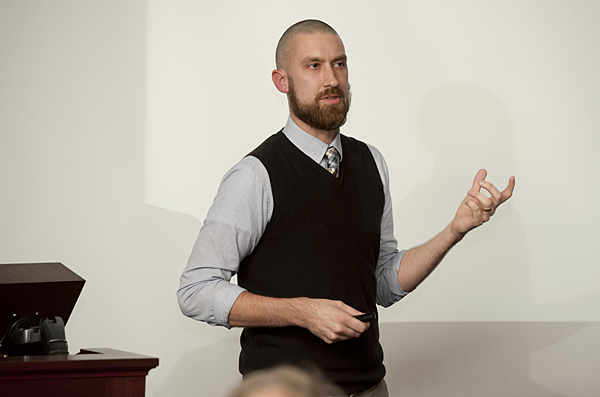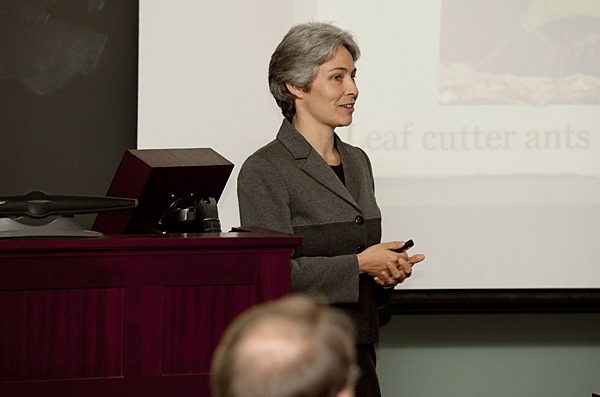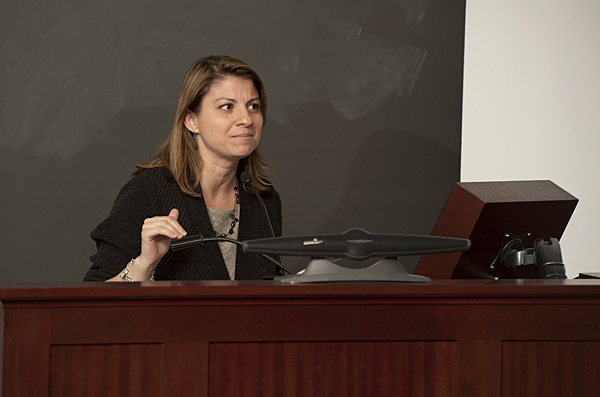Matching up researchers
Social scientists share research on health care policy
4:20 p.m., Nov. 11, 2011--What is the role of empathy in preclinical medical education? What is the connection between low birth weight and future susceptibility to chronic disease? What are the causes of obesity in underserved populations?
Three University of Delaware faculty members discussed their scholarship in these and related areas at a research colloquium on Wednesday, Nov. 9. The event was part of an ongoing effort to forge new connections between health and social sciences.
Research Stories
Chronic wounds
Prof. Heck's legacy
In a “speed-dating-for-researchers” format, sociologist Barret Michalec, anthropologist Melissa Melby and epidemiologist Mia Papas provided highlights of close to a dozen projects in 90 minutes. Topics included the origins of childhood obesity, the experience of black premed students and fast food consumption as a risk factor for chronic disease.
Not surprisingly, the three use very different research methods. Michalec often employs focus groups, while Papas joked that she doesn’t talk to people, only to numbers. And as an anthropologist, Melby bases her experimental designs on naturally occurring trends rather than on human-implemented interventions.
But they all face some of the same challenges in their research. The biology of populations and the behavior of individuals can lead to some apparent paradoxes and contradictions, making it difficult to tease out causes and effects — an effort that is critical to designing effective interventions.
For example, Papas noted that while average BMI (body mass index) is generally lower in areas with high “walkability” — that is, densely populated multiuse urban areas with sidewalks — planners shouldn’t jump to the conclusion that quantitative measures of walkability will automatically translate into increased physical activity. “Other factors may play a greater role in influencing obesity in economically disadvantaged areas,” she said.
Similarly, Melby noted that the consumption of soy products seems to have a beneficial effect on menopausal symptoms in Japanese women but not in Americans. It turns out that a metabolite found more commonly in Japanese women may account for this phenomenon, so a simple dietary change in American women is not the answer.
Michalec pointed to the current emphasis on a team-based approach to health care, where most research to date has focused on the patient. “But what do health sciences students think of this, and how does it impact providers?” he asked. Michalec cited work on baboons showing that the complete absence of a social hierarchy can create even more problems than the presence of a rigid one.
Lively question-and-answer sessions followed each of the 20-minute presentations, including active engagement among the three presenters.
“We have a great deal of ability to explore these issues and a variety of people in the audience — including funders, mentors, and collaborators — to keep this conversation going,” said discussion moderator Joseph Pika. “And I think this experience has helped to build a network among these three young researchers that will help them as they move forward with their work.”
About the series
The colloquium followed the Social Sciences and Human Health Symposium, held on campus in September to advance cross-campus collaborations in the two fields, and is part of a series of events scheduled for the 2011–12 academic year to spark dialogue about the growing role of social sciences and translational research.
The final event this calendar year will be Dec. 8, in 103 Gore Hall, when James Newman, senior vice president and executive director of the Christiana Care Value Institute, will speak about “The Christiana Care Value Institute: Concept, Evolution and Opportunities for Collaboration.”
The events are sponsored by the Provost’s Social Sciences Task Force and planned by a sub-group including Joseph Pika, interim associate dean in the College of Arts and Sciences and professor in the Department of Political Science and International Relations; Elizabeth Orsega-Smith, associate professor in the Department of Behavioral Health and Nutrition; Sue McNeill, professor in the Department of Civil and Environmental Engineering; Karl Steiner, senior associate provost for research development; and Leigh Botner, manager of proposal development.
Article by Diane Kukich
Photos by Kathy F. Atkinson













